BIRD BOX BARCELONA (2023)
After the world is ravaged by mysterious entities, rival groups of survivors struggle in a decaying city.
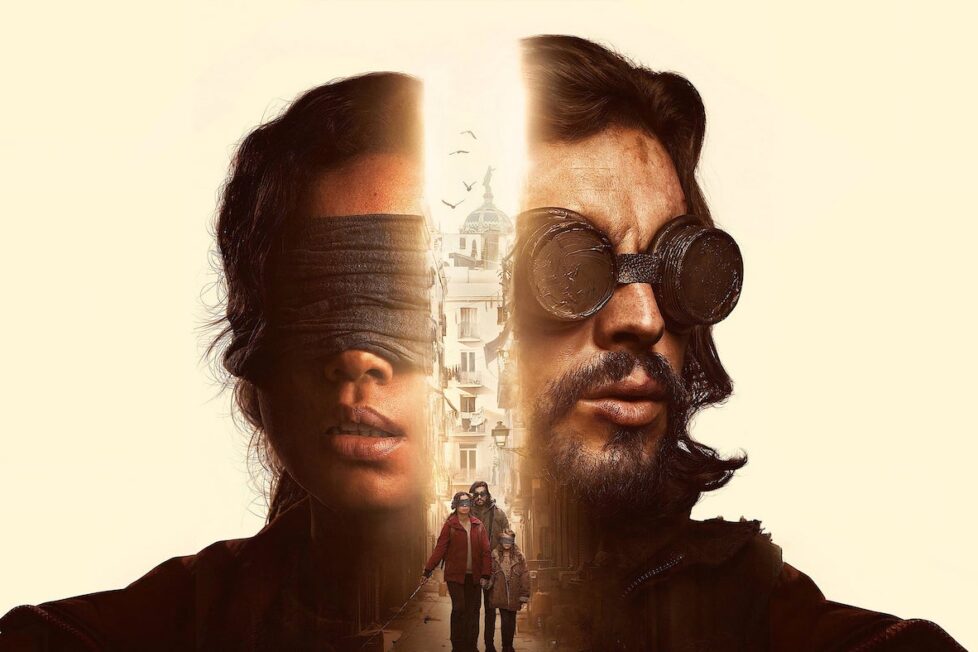
After the world is ravaged by mysterious entities, rival groups of survivors struggle in a decaying city.


Moral ambiguity is to be expected in any halfway serious drama, but there’s one genre where (with only a few exceptions) the Manichean division of the world, into good guys and bad guys, reigns as strong as it ever did in the Hollywood studio western: the post-apocalyptic.
Never mind that, in reality, our experiences of natural disasters suggests that people’s first inclination is to cooperate and not kill each other over the last can of cola; in shows like The Walking Dead (2010-2022), which carried it to tedious extremes, the real enemy is no longer the cause of the apocalypse but the greed or derangement of other victims.
Bird Box Barcelona, a sequel to Netflix’s 2018 hit, falls into this trap. To be fair, one of its main characters is morally ambiguous—and, in fact, their realisation of their own errors is central to the movie, albeit predictable. And it’s also true the first Bird Box wasn’t without its clichés either. But where the mortal dangers posed by a global invasion of inexplicable entities, and the subsequent social collapse, were centre-stage in the original, in Bird Box Barcelona they take second place to Bad Survivors vs Good Survivors.
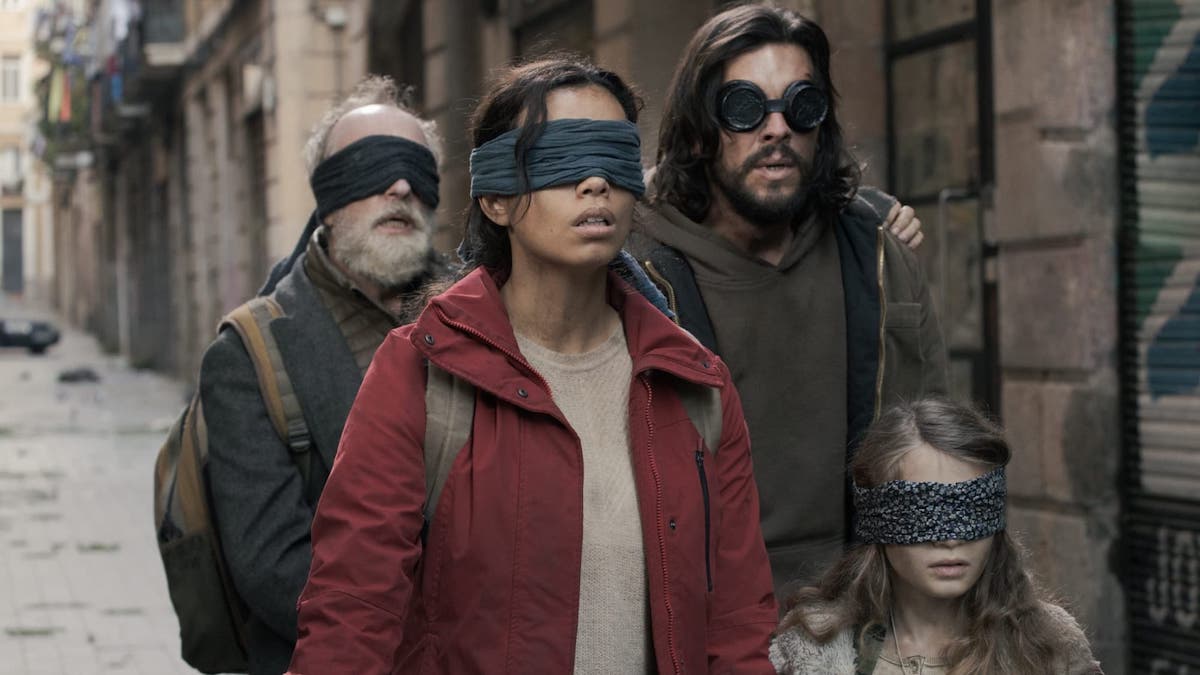
As happens too often, this conflict isn’t very interesting, and as a result Bird Box Barcelona—the intended beginning of several spin-offs looking at the experience of this apocalypse in different countries—suffers from the exact same problems that afflicted 28 Weeks Later (2007) in comparison to that film’s attention-grabbing predecessor: the premise is no longer novel and yet there’s not much in the way of story or character to make up for that shortcoming.
Going far into the plot is difficult without spoilers, because one of the best things in the movie is a genuinely big surprise early on. Still, Bird Box Barcelona seems to be set around a year after the arrival—presumably worldwide—of the entities. It may take place earlier than the five-years-on framing narrative of the original, but it’s later than the original’s main story; though there are ample flashbacks to the first days of the cataclysm, even if they don’t form the bulk of the story as they did in 2018.
“Can I open my eyes now?” is the first line, spoken by young Anna (Alejandra Howard) to her father, former engineer Sebastián (Mario Casas). But she can’t, of course, as even a glimpse of the entities drives people to madness and suicide, so survivors have to stumble through the streets either blindfolded or wearing blacked-out goggles.
A few, however, are able to look at the entities without destroying themselves, though their sanity may well be affected. These self-styled “seers” (also featured in the first movie, but playing a larger role here) refer to others as “sheep”—it’s not clear whether in a Christian or a conspiracist sense, so perhaps both—and seem to believe that by forcing others to look, they’ll save their souls even if they die in the process.
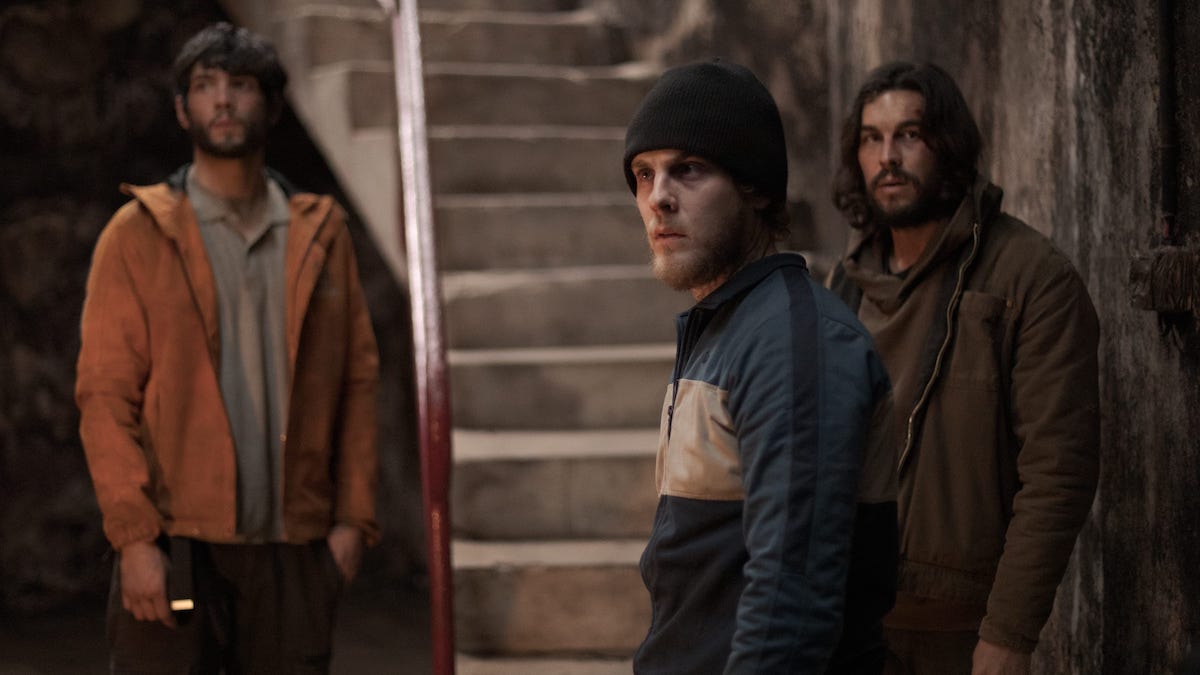
The stage is thus set for a state of constant conflict between the seers (the Bad Survivors) and other groups determined not to look at all costs (the Good Survivors). Of course, Sebastián finds himself in one of the latter groups, along with young English psychiatrist Claire (Barbarian’s Georgina Campbell), who’s recently written a book on “how to survive the modern world” (she acknowledges the irony). Among others in their group are a German girl who became separated from her mother in the chaos after the entities’ arrival (Naila Schuberth), a strong-minded elderly man (Gonzalo de Castro), and his partner (Lola Dueñas).
If the importance of the relationships between adults and girls in this stricken world inevitably raises memories of HBO’s The Last of Us, the deadly power of mere sight in both Bird Box films interestingly echoes several other apocalyptic exercises. The Turkish TV series Hot Skull, the Canadian film Pontypool (2008), and A Quiet Place (2018) all explored the possibilities of sound—rather than zombie bites—as the thing to be feared. The way a similar idea, using sight, was developed was the most novel thing in the original Bird Box; and despite a few implausibilities it remains well exploited in this sequel.
It’s true that at, one point, two characters with their eyes covered get away with acrobatics that would seem difficult when sighted, and it’s also true that the Good Survivors once again don’t seem to have thought of the obvious tactic of building structures to help them navigate the world beyond their redoubts. (A simple tunnel of cardboard boxes would get them safely across a street, for example). But Bird Box Barcelona often vividly depicts how the new threat adds peril to the smallest of everyday activities. People rope themselves together so they don’t get separated; even dogs are blindfolded; a man has to cover himself with a blanket and rifle through unopened mail in an apartment building lobby to figure out where he is in the city.
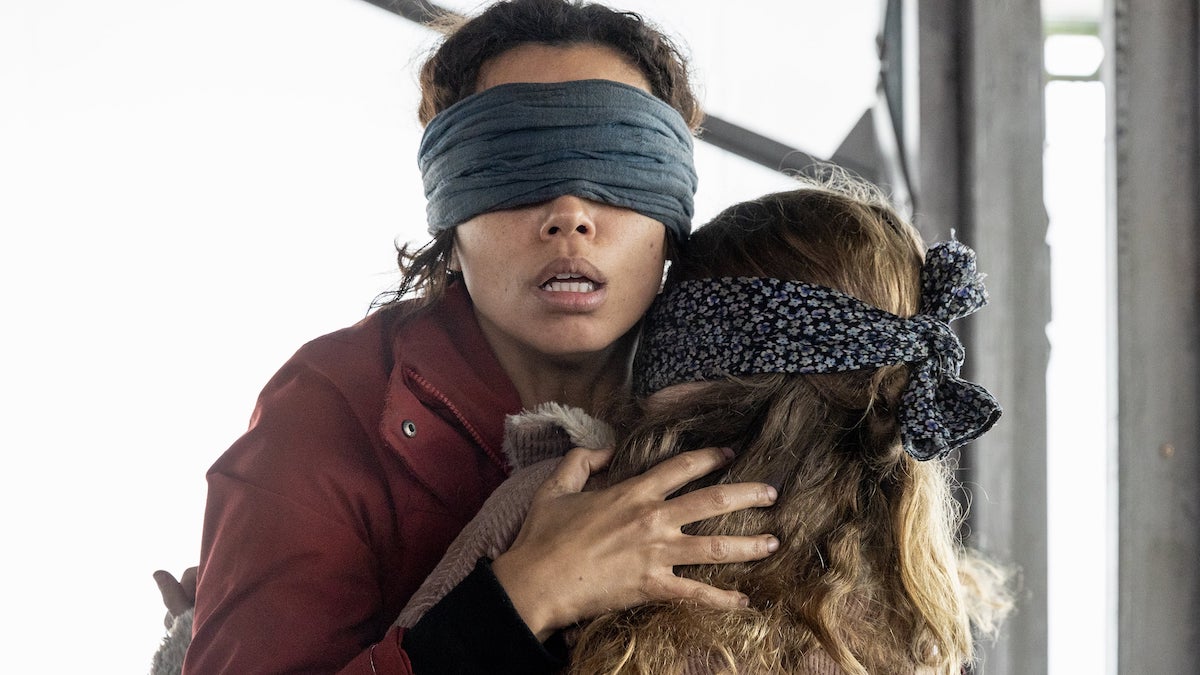
The entities themselves (“creatures” in usual genre parlance, but it’s not clear they are creatures) are, if not quite explained, considered in more detail than in the first Bird Box. It becomes apparent that, while they kill through vision, they lure their victims through sound, as Claire and Sofia are tempted to look by hearing voices of their brother and mother respectively, for example, and another character hears the whining of a dog that he’s lost.
There’s questionable discussion of whether they might be quantum phenomena (where the writer-directors, or perhaps just a character, seem to take the idea of the observer effect too literally), and some exposition about genetic differences in the seers which feels like a tacked-on attempt to answer a glaringly obvious question, but which also opens up sequel possibilities.
Many things remain unanswered, though. The logic of safety and danger isn’t always totally clear (where exactly can the entities go and where can’t they?), and nor is it clear to what extent their invisibility on-screen is diegetic. Even though we the audience never see them, do people in the world of the movie always see them, or are they sometimes detectable only as they are to us—by the fleeing of birds and the movement of debris?
Indeed, though some creature’s-eye-view shots suggest that they do have a physical existence, it’s not completely certain on the evidence of Bird Box Barcelona that the entitities are corporeal at all, and this goes to the heart of a spiritual theme that was present in the original but comes more to the fore here.
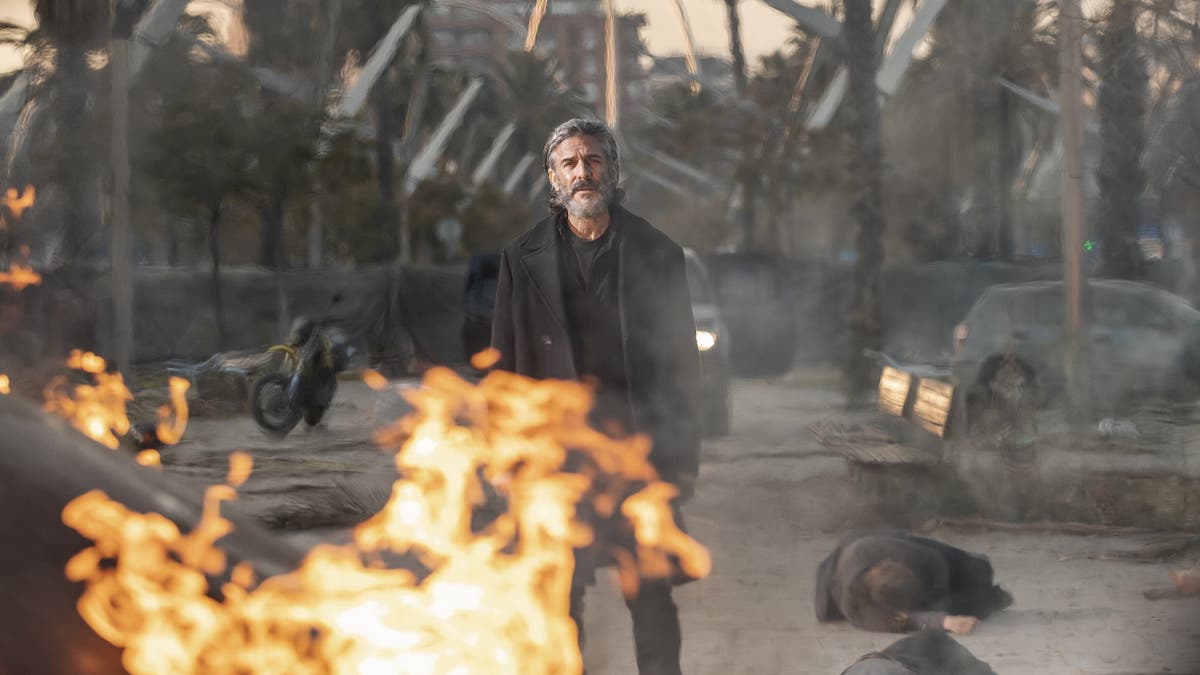
As Claire says, “some people see demons, others see aliens” in the entities, and demons were indeed proposed as an explanation in the first Bird Box. But this one plays more with the idea they might actually be angels, as this is the essence of the seers’ belief (or delusion), and a priest makes the connection explicit early on, with heavenly choirs on the soundtrack reinforcing it. Sebastián is even seen in one shot with the rose window of a church looming behind his head, halo-like.
So there’s plenty of conceptual meat for Álex and David Pastor, the writer-director brothers, to work with in Bird Box Barcelona. But beyond those few hasty speeches on the Second Coming, on quantum physics or on genetics, they don’t really do much with it, and what the seers believe—or indeed what the entities actually are—is ultimately irrelevant to the storyline. They’re just Bad Survivors and monsters.
On the plus side, there are decent performances from Campbell, Howard, Schuberth, de Castro, and Dueñas, despite the screenplay not allowing much depth of characterisation. This limitation is especially evident in its effect on Casas, a well-regarded actor who comes across in Bird Box Barcelona as rather bland, in part because his character is essentially a plot device more than an actual person. Later on the emphasis moves somewhat away from him to Campbell’s Claire, and the ending suggests that she just could reappear in a sequel.
There is also some fine photography from Daniel Aranyó even if the visual mood is a little samey—a scene where a discarded coffee cup in a metro station heralds an early (non-)appearance of the entities is beautifully shot and directed—and some effective editing by Martí Roca, often quite terse but never jerky.
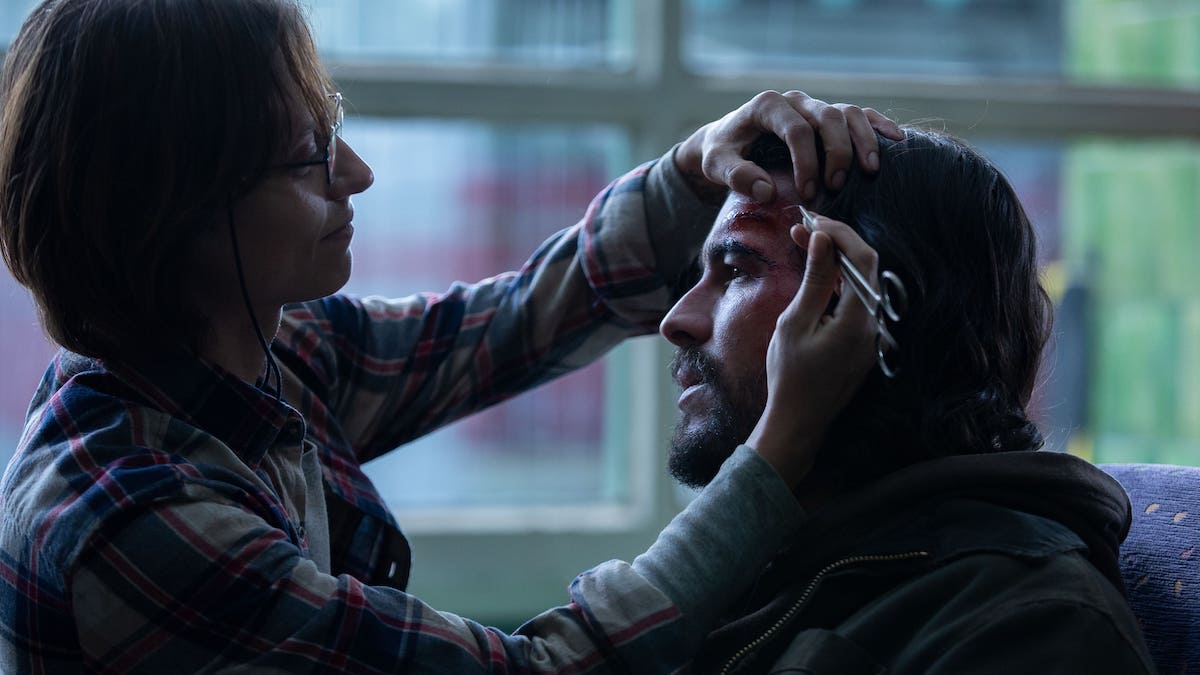
Barcelona itself (where the Pastor brothers also set their 2013 apocalyptic tale The Last Days) plays surprisingly little part in the movie. The castle at Montjuic is pivotal to the plot but hardly seen; there are a few shots of a decaying Plaça de Catalunya (well done), Barceloneta beach and the W hotel, and that’s about it. I don’t think Sagrada Familia is shown once, which I guess is a kind of originality in itself; most of the settings will be unrecognisable to a non-local but I imagine many residents of Barcelona watching the movie will get the same kind of momentary frisson I did when some characters reached Carrer de la Diputació, only a few streets from my office.
The film’s best action sequence does involve a well-known Barcelona feature, if not quite a landmark: a struggle near a cable car station. But whatever the location, it’s rarely that Bird Box Barcelona achieves the tension of this climactic scene, and it is even rarer it offers anything beyond the most obvious tropes in terms of human drama. For the most part, it’s a post-apocalyptic conflict movie of superficial talk and perfunctory action; in some such films, strengths on one side can make up for weaknesses on the other, but not here.
SPAIN | 2023 | 112 MINUTES | 2.35:1 | COLOUR | SPANISH • ENGLISH • GERMAN

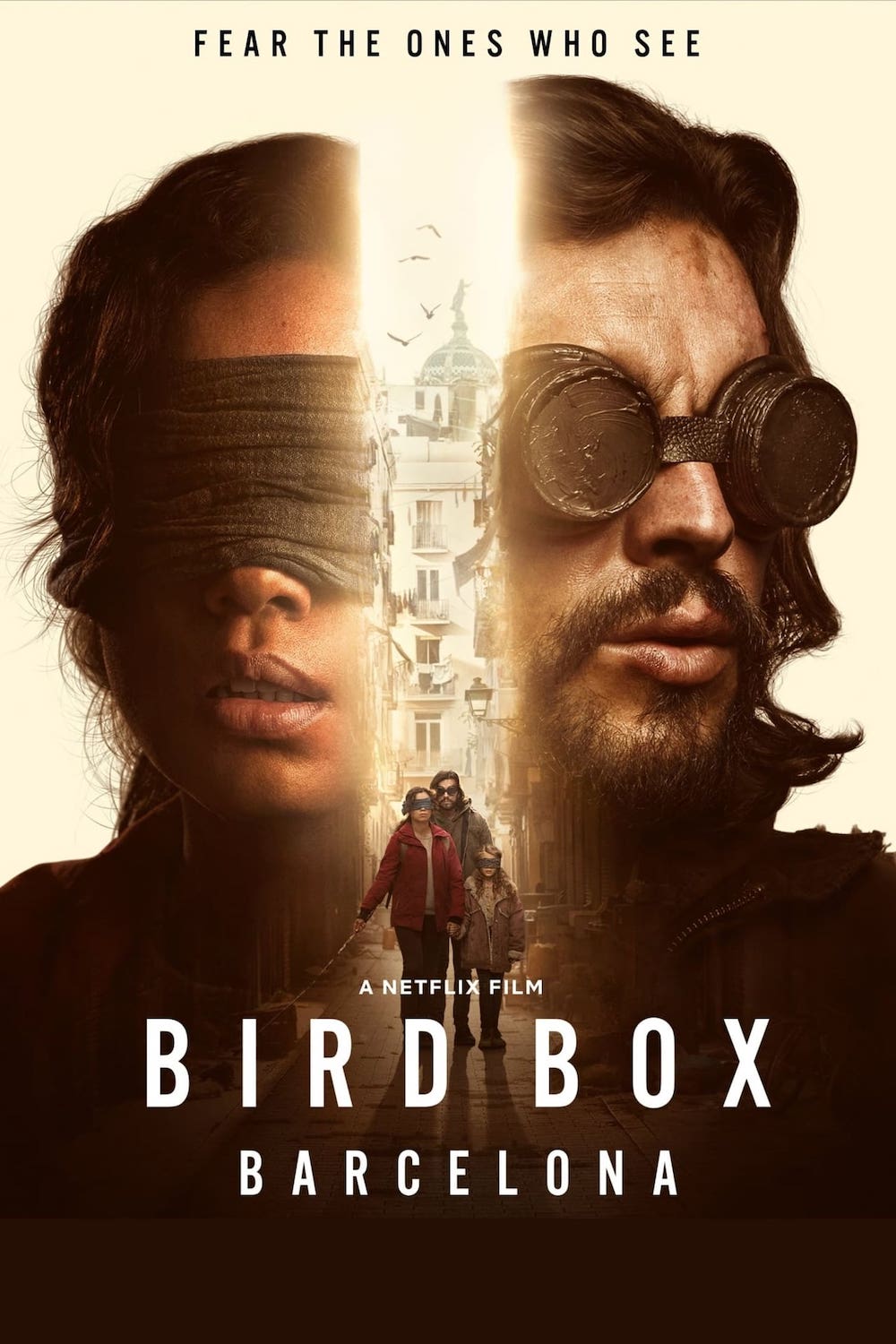
directors: Álex Pastor & David Pastor.
writers: Álex Pastor & David Pastor (based on the novel by Josh Malerman).
starring: Mario Casas, Alejandra Howard, Georgina Campbell, Naila Schuberth & Diego Calva.
